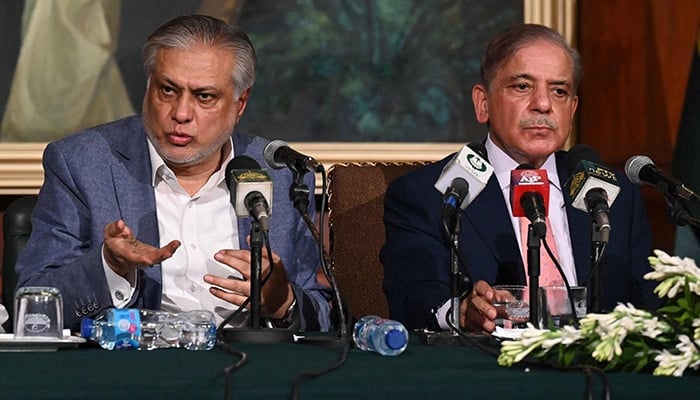Shehbaz to head ECC, Dar cabinet panel on privatisation
ECC includes ministers for finance, economic affairs, commerce, power, petroleum and planning, development and special initiatives
ISLAMABAD: Prime Minister Shehbaz Sharif has constituted six separate cabinet committees on economic coordination, energy, Chinese investment projects, privatisation, State-Owned Enterprises (SOEs) and disposal of legislative cases.
The committees have been constituted in terms of Rule 17(2) of Rules of Business 1973. The prime minister himself will chair the Economic Coordination Committee (ECC) of the cabinet which also comprises ministers for finance, economic affairs, commerce, power, petroleum and planning, development and special initiatives. However, in the PM’s absence, the finance minister would chair the ECC meetings.
The ECC also includes the Planning Commission deputy chairman, State Bank of Pakistan governor, Securities Exchange Commission of Pakistan chairman, Federal Board of Revenue chairman, Board of Investment chairman and federal secretaries for Power Division, Commerce Division, Communications Division, Finance Division, Industries and Production Division, Economic Affairs Division, Petroleum Division, Planning, Development and Special Initiatives Division, National Food Security & Research Division, Privatisation Division, Railways Division, Revenue Division, Poverty Alleviation & Social Safety Division and Water Resources Division.
Pakistan, law secretary, cabinet secretary and additional secretary of the PM Office are co-opted members of the committee.
The committee will see whether fresh legislation or amendments to the existing laws are in line with the constitutional scheme, not in violation of any existing law, and fall within the mandate of parliament.
It would also examine the contents of fresh legislations/ rules and the existing laws/rules and recommend if they are in line with the policy of the government and constitutional and legislative schemes.
-
 Andrew Mountbatten Windsor Blunders Are Result Of 'conspiracy Of Silence'
Andrew Mountbatten Windsor Blunders Are Result Of 'conspiracy Of Silence' -
 Keith Urban Fires Entire Management Team After Divorcing Nicole Kidman
Keith Urban Fires Entire Management Team After Divorcing Nicole Kidman -
 Kylie Jenner Marks Death Anniversary Of Hairstylist Jesus Guerrero With '222' Tribute
Kylie Jenner Marks Death Anniversary Of Hairstylist Jesus Guerrero With '222' Tribute -
 Daniel Radcliffe On How It's Like Seeing New Harry Potter Cast Years Later
Daniel Radcliffe On How It's Like Seeing New Harry Potter Cast Years Later -
 Andrew Portrait Makes Unexpected Debut At Louvre Museum Over Epstein Protest
Andrew Portrait Makes Unexpected Debut At Louvre Museum Over Epstein Protest -
 Italy: Skeleton Of Saint Francis Of Assisi’s Goes On Public Display For First Time After 800 Years
Italy: Skeleton Of Saint Francis Of Assisi’s Goes On Public Display For First Time After 800 Years -
 Hailey Bieber's Subtle Gesture For Eric Dane’s Family Revealed
Hailey Bieber's Subtle Gesture For Eric Dane’s Family Revealed -
 Moment Prince William 'broke Down' And 'apologised' To Kate Middleton
Moment Prince William 'broke Down' And 'apologised' To Kate Middleton -
 Paul Mescal And Gracie Abrams Stun Fans, Making Their Romance Public At 2026 BAFTA
Paul Mescal And Gracie Abrams Stun Fans, Making Their Romance Public At 2026 BAFTA -
 EU Rejects Any Rise In US Tariffs After Court Ruling, Says ‘a Deal Is A Deal’
EU Rejects Any Rise In US Tariffs After Court Ruling, Says ‘a Deal Is A Deal’ -
 King Charles Congratulates Team GB Over Winter Olympics Success
King Charles Congratulates Team GB Over Winter Olympics Success -
 Meryl Streep Comeback In 'Mamma Mia 3' On The Cards? Studio Head Shares Promising Update
Meryl Streep Comeback In 'Mamma Mia 3' On The Cards? Studio Head Shares Promising Update -
 Woman Allegedly Used ChatGPT To Plan Murders Of Two Men, Police Say
Woman Allegedly Used ChatGPT To Plan Murders Of Two Men, Police Say -
 James Van Der Beek's Widow Mourns Eric Dane Days After Husband's Death
James Van Der Beek's Widow Mourns Eric Dane Days After Husband's Death -
 UK Seeks ‘best Possible Deal’ With US As Tariff Threat Looms
UK Seeks ‘best Possible Deal’ With US As Tariff Threat Looms -
 Andrew Arrest Fallout: Princess Beatrice, Eugenie Face Demands Over Dropping Royal Titles
Andrew Arrest Fallout: Princess Beatrice, Eugenie Face Demands Over Dropping Royal Titles




